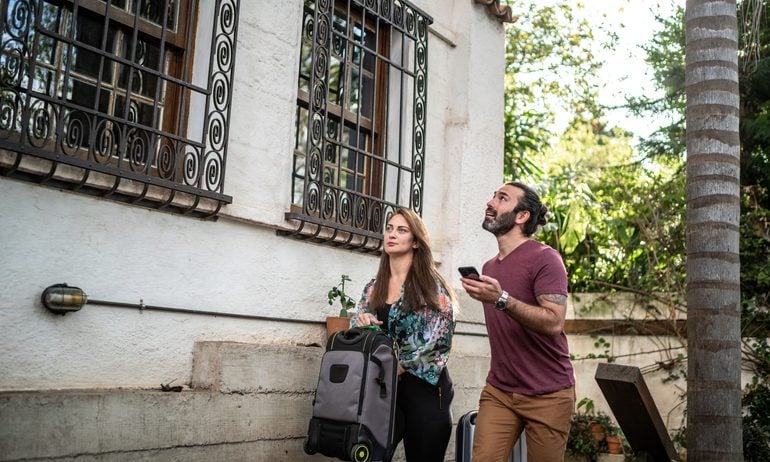How to Start an Airbnb Business in 6 Steps — and Make Money
Prepare your space, set your price and get real about the money you can make when becoming an Airbnb host.

Many, or all, of the products featured on this page are from our advertising partners who compensate us when you take certain actions on our website or click to take an action on their website. However, this does not influence our evaluations. Our opinions are our own. Here is a list of our partners and here's how we make money.
Starting an Airbnb business requires time, effort and investment just like other business ventures. Before becoming an Airbnb host, you’ll want to understand the rules and tax implications, thoughtfully design your space and research listings in your area to make sure your pricing is competitive.
Here’s what that process looks like, along with other key steps to starting an Airbnb business.
Your financial questions, answered



How to start an Airbnb business
1. Find out if you need permission
Get the proper permission from your landlord, co-op board or homeowners association, if relevant, to list your space as a vacation rental on Airbnb.
Read your lease, which may include a provision about subletting.
Check if your homeowners association has restrictions regarding short-term rentals, or renting your home on a short-term basis.
2. Prepare your Airbnb rental
Whether it's a single room that shares your bathroom, a private wing with its own entrance or your entire home while you take off for the weekend, you likely need to invest something in the space — both before creating your Airbnb listing and for ongoing upkeep. Some costs to consider include:
Installing a keyless lock to make check-in easier.
Buying things that make the space more comfortable for long-term guests, such as a fridge, microwave and coffee maker.
Building a wall to close off a room.
Creating a separate, furnished television area.
Stocking the space with clean sheets, towels and toilet paper. (To score the highest ratings, you'll need to go above and beyond those basics.)
Paying higher utility bills.
Providing cleaning services between reservations.
Compensating a co-host (see below).
Covering taxes and the Airbnb host fee.
3. Set your price
Consider Airbnb pricing statistics, and think about affordability, audience and market.
Airbnb fees for most hosts is 3% of the booking subtotal. The fee may be higher for some hosts, including those with vacation rentals in Italy. The listing price your guests see is higher than what you earn.
Airbnb's metrics show how your nightly prices compare to other Airbnb property listings in the area, as well as when to consider lowering (or raising) your prices on certain days of the week or for surges in demand. You can set minimums for the number of nights people can stay at your location, which can offset the cost of turning over the space (cleaning and upkeep). You can also consider charging for extra guests or for additional services you provide, such as cleaning, equipment rental, pet-friendliness or tours.
Airbnb charges guests before arrival, and it sends you your money according to the method of your choice (PayPal or direct deposit, for example) 24 hours after your guest checks in. You cannot accept cash payments for your Airbnb. You can accept Visa, Mastercard, American Express, Discover, debit cards, Apple Pay, Google Pay and PayPal.
Other factors might affect how much you get paid, including weekly or monthly discounts, weekend or seasonal pricing, payment for co-hosts you enlist, or value-added tax (VAT) in certain non-U.S. locations.
Your financial questions, answered



4. List your Airbnb property
Write an honest Airbnb listing; don’t exaggerate things or withhold information about problem areas.
Highlight what’s special about your space so you stand out from other Airbnb listings.
Note accessibility features that can help guests easily navigate the space.
Include great photos to help your guests understand the space’s size and features.
5. Hire or enlist some help (a co-host)
Running a vacation rental could take up more time than you expect. You may want to have at least one other person help you with:
Emails and communications.
Repairs or requests at the site.
Urgent issues.
Neighborhood-specific tips for guests.
The check-in process.
Add your co-host to your listing (you can add up to 10), and make sure they understand Airbnb's Co-host Terms of Service. You and your co-host will determine how much they'll be paid per reservation. If you can't find a trusted co-host, third-party property management companies can help hosts deal with inquiries, clean spaces and more.
6. Host an Airbnb experience
If you're not in a position to set up a short-term rental, you can host an Airbnb experience instead.
Airbnb Experiences is the platform's tour-guide service, which hooks up guests with knowledgeable hosts for unique, hyper-local activities. Think yoga classes under the Eiffel Tower, surf lessons at Venice Beach, a Harry Potter walking tour in London or a pasta-making class in Rome. Airbnb experiences aren't available in every city, though.
You pick your schedule, how often you can host, the size of the group you can oversee and your rate.
You'll need to submit an application with Airbnb, which will vet you and your experience. Airbnb typically responds within a week, but be sure it’s accepting new applications before investing too much time in the experience. You might need to register as a business or get a business license depending on your local laws and whether your gig meets with your jurisdiction's definition of business activities. Pay attention to legal stipulations if your planned experience involves alcohol, food or transportation.
Learn more about starting a business
How much can you make owning an Airbnb?
On average, hosts in the United States make more than $13,800 per year, according to Airbnb, but those numbers vary. Some hosts buy or lease a number of apartments or homes and rent them out full time.
Your earning potential depends on:
How much you charge for your space.
How often you can rent it out.
Both of those things depend on how much time and money you spend on furnishing and maintaining your Airbnb property.
Airbnb says it is active in more than 100,000 cities around the world, with more than 7 million
listings. For the vast majority of people, becoming a host is a side-hustle — not a full-time job with full-time earning potential.
Keep your profit expectations conservative, especially if you're not willing or able to contribute huge amounts of time and energy into your hosting gig.
The more effort you put into your space to make it as beautiful, functional and comfortable as possible — and the more time you allot to responding to guest concerns — the better your reviews and ratings will be. Responding to inquiries quickly is key.
You get rated on overall experience, accuracy, cleanliness, communication, check-in, location, value and amenities. Good reviews can help you rise in Airbnb’s search rankings, and being high in the search rankings means you'll appear more often in people’s search results, which can result in more bookings.
How much are Airbnb taxes?
Sales tax
Your city may require you to collect sales tax or gross receipts tax from guests, and you'll need to let guests know the exact amount before they book. You might collect that tax from your guests when they book.
Income tax
Running an Airbnb can make you a small-business owner in the eyes of the IRS, so you’ll need to report your Airbnb income and expenses on your federal tax return, regardless of whether you made enough to receive tax forms from the company.
If you made more than $20,000 on Airbnb in 2023, the company likely sent you (and the IRS and state) a Form 1099-K. That amount was reduced to $5,000 for 2024. A 1099-K helps you calculate and report how much business income you received.
Tax deductions
On your tax return, you may be able to deduct certain expenses associated with your Airbnb business. These expenses might include:
The mortgage or rent on the Airbnb property.
Utilities consumed during stays.
Property insurance.
Repairs to the property.
Cleaning service.
Consult a qualified tax pro to make sure you're taking the right deductions.






